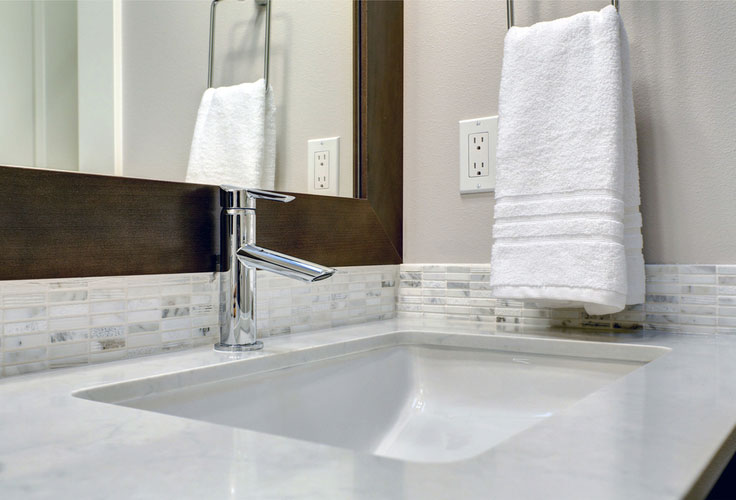Granite countertops may feel rough due to etching from acidic substances or insufficient sealing. Residue from cleaning products can also create a coarse texture.
Exploring the reasons behind a rough granite countertop surfaces as a common concern for homeowners. Granite, a durable and beautiful natural stone, is known for its smooth finish when properly maintained. Yet, it’s not immune to wear and tear or maintenance issues.
Etching, a chemical reaction caused by acidic materials like lemon juice or vinegar, can dull and roughen the surface. Failing to seal the granite adequately leaves it vulnerable to absorbing spills and stains, leading to a gritty feel. Moreover, the buildup of harsh cleaning products can mar the surface, diminishing its natural smoothness. Understanding these factors is essential in preserving the sleek and polished appeal of granite countertops in any home.

Credit: www.amazon.com
The Appeal Of Granite Countertops
Granite countertops capture hearts with their natural beauty and resilience. These stone surfaces serve not just as a functional workspace but also as a design statement. The variety of colors and patterns make each countertop a unique piece of art. Homeowners and designers often choose granite for its luxurious look that can significantly increase a home’s value.
Aesthetic And Durability Advantages
Granite stands out for its durable qualities and stunning appearance. Its hard surface resists scratches and heat, making it ideal for busy kitchens. This natural stone also maintains its luster for years, resisting fading and staining. The following points highlight the aesthetic and durability advantages of granite countertops:
- Unique patterns: No two slabs are the same, giving your kitchen a one-of-a-kind look.
- Maintenance: A simple wipe down with mild soap and water is enough for daily care. Granite’s hardiness ensures longevity with minimal effort.
- Heat resistance: Hot pots and pans can be placed directly on the surface without fear of damage.
Popularity In Modern Kitchens
Granite countertops continue to reign in kitchen design. The reasons for their popularity include:
- Timeless beauty: Granite offers a classic look that never goes out of style.
- Boosts home value: Kitchens with granite countertops are appealing to buyers, boosting your home’s marketability.
- Versatility: Granite fits with any kitchen theme, from rustic to modern.
As homes evolve, granite remains a top choice for those seeking a blend of function and luxury.
Potential Reasons For Roughness
Your granite countertop should feel smooth to the touch. If it’s rough, something isn’t right. Let’s explore why granite might lose its polished feel.
Inherent Variations In Stone Texture
Not all granite is created equal. Natural stone comes with variations. Here’s what could make the texture rough:
- Pits and fissures: These are small spaces in the rock.
- Crystal makeup: Different minerals can affect smoothness.
Impact Of Daily Wear And Tear
Everyday use can take a toll on your countertop’s surface. Consider these factors:
| Factor | Effect on Granite |
|---|---|
| Acidic substances | May cause etching. |
| Harsh cleaners | Can strip sealant and damage stone. |
| Abrasive scrubbing | Could scratch and dull the surface. |
Effects Of Improper Care
Effects of Improper Care can leave granite countertops feeling rough to the touch. This luxurious stone needs proper maintenance to conserve its polished surface. Neglecting the correct care results in a lackluster appearance and diminished durability. There are several common missteps owners make that deteriorate granite’s finish.
Using Abrasive Cleaners
Cleaning granite with abrasive solutions can cause irreparable damage to the countertop’s finish. These cleaners may scratch and degrade the sealant layer, exposing the stone to stains and moisture. Always opt for mild soap and warm water to avoid surface etching and ensure the longevity of the granite.
Lack Of Regular Sealing
Without timely reapplication of sealant, granite becomes susceptible to stains and water damage. This negligence allows liquids to penetrate, leading to a rough and uneven surface. A professional sealant every one to two years keeps the granite resilient against wear and tear.
| Do’s | Don’ts |
|---|---|
| Use coasters under glasses | Place hot items directly on the surface |
| Wipe spills promptly | Use vinegar or lemon for cleaning |
| Clean with mild detergent | Chop or slice without a cutting board |
- Blot up stains immediately.
- Apply sealant regularly.
- Use soft cleaning cloths.
Professional Restoration Techniques
Granite countertops should feel smooth and luxurious. If yours feels rough, don’t worry. Professional restoration can bring back the shine. Skilled technicians use proven methods to make countertops look new. Let’s explore these expert techniques.
Resurfacing Processes
Resurfacing granite countertops involves several steps. Specialists start by cleaning the surface. They remove stains and fix chips. Then they sand the granite. This smooths out rough patches. Next comes the important step of honing. It prepares the stone for the final polish.
Benefits Of Polishing And Sealing
Let’s talk about polishing and sealing. These steps have big benefits. Polishing makes granite shiny. It also protects the stone. Think of it like waxing a car. It looks great and stays safe from scratches.
- Shine: Polishing reveals a natural glow in the granite.
- Smoothness: It makes the surface feel sleek to touch.
- Protection: Sealing keeps stains and damage away.
A well-done seal lasts for years. It keeps your countertops easy to clean. It also stops bacteria from getting in. Always pick professionals for this. They know the right products to use. They make your granite safe and stunning.
| Benefit | Polishing | Sealing |
|---|---|---|
| Appearance | Makes granite sparkle | Preserves shine over time |
| Touch | Smoothens surface | Keeps it smooth |
| Protection | Reduces scratch risk | Bars stains and bacteria |
Diy Solutions For Smoother Surfaces
Is your granite countertop not quite as smooth as it once was? A rough granite surface can be frustrating. Yet, this is a common issue that can happen over time. The good news is, with a few simple DIY solutions, you can restore the smoothness of your countertop right at home. Let’s dive into some home polishing tips and preventive measures that will keep your granite looking glossy and feeling smooth for years to come.
Home Polishing Tips
To revive your granite countertop’s sleek finish, follow these home polishing tips:
- Choose the right polish: Buy a polish made for granite surfaces.
- Clean the countertop: Use a soft cloth and a mild detergent.
- Apply granite polish: Follow the product instructions carefully.
- Buff the surface: Use a clean, soft cloth in a circular motion.
- Rinse and dry: Wipe off excess polish with a damp cloth. Then dry.
Regular polishing keeps your countertop shiny and smooth. It removes small rough spots and restores the stone’s luster.
Preventive Measures For Sustained Smoothness
Prevention is key to keep your granite smooth over time. Here’s how to maintain your countertop:
| Do | Don’t |
|---|---|
| Use coasters under glasses | Place hot items directly on the granite |
| Wipe spills immediately | Use harsh cleaners or sponges |
| Re-seal granite as needed | Cut directly on the surface |
Maintain these practices and your granite countertop will keep its smoothness much longer. Regular attention goes a long way in keeping your surfaces in top shape.

Credit: www.reddit.com

Credit: stylebyemilyhenderson.com
Frequently Asked Questions On Why Is My Granite Countertop Rough
Why Does Granite Feel Rough?
Granite countertops may feel rough due to residual grit, incomplete polishing, or the presence of pits and fissures that are natural to the stone.
Can Sealing Granite Improve Surface Smoothness?
Sealing granite does not smooth the surface, but it protects against stains and can make cleaning easier, maintaining its refined texture.
How Often Should Granite Be Polished?
Polishing frequency depends on usage, but generally, granite countertops benefit from professional re-polishing every 1 to 3 years to maintain shine and smoothness.
What Causes Granite Erosion And Dullness?
Granite dullness can result from abrasion, acid etching, improper cleaners, or a lack of maintenance, all of which erode the polished surface over time.
Is Diy Smoothing A Granite Countertop Advisable?
DIY smoothing of granite is possible with right tools and techniques, but professional services are recommended to avoid damage and ensure a uniformly smooth surface.
Conclusion
Understanding why your granite countertop feels rough can save you from future worries. Regular maintenance and immediate action when issues arise ensures lasting smoothness. Don’t let minor problems escalate; keep your granite in top condition and enjoy its enduring beauty in your home.




Leave a Reply